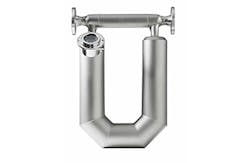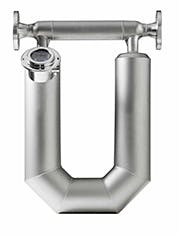Use of Coriolis-based custody transfer advances with technology
By Patrick Bartell and Nathan Ehresman
When addressing the needs of measurement operations involving various densities and amounts of liquid, Coriolis mass flowmeters are often chosen for their accuracy, durability and reduced maintenance costs. Applications involving custody transfer benefit from their simple and dependable characteristics, as well as their usefulness in advanced well-site automation systems.
Custody-transfer operations are wholly dependent on the accuracy and repeatability of the measurement of the oil that is being produced. Coriolis meters help remove the ambiguity from the custody transfer discussion between involved parties and as a result, Coriolis meters have become the popular choice in the measurement and allocation of crude oil and various other fossil fuels in well-site applications.
When discussing Coriolis mass-flowmeters in relation to custody-transfer operations, the primary benefit is the accuracy of the measurements available to the involved parties. By measuring the mass of a liquid rather than the volume, the basic process used by a Coriolis meter is substantially more reliable than other available flowmeters. For example, the volume of oil in a tank will vary depending on what its internal temperature is, but the total mass of the oil will not fluctuate. Coriolis meters capitalize on this effect to provide the most accurate measurement possible.
Nearly all lease agreements require that the accuracy of the mass flowmeter be tested and proven on a regular basis. This process involves the measurement of a liquid with a predetermined volume by the flowmeter in question to indicate the difference between the actual volume of the liquid and the meter’s indicated volume. It is in this area that the repeatability offered by the Coriolis mass-flowmeter is a large advantage, further reinforcing the meter type as an industry favorite.
Durability advantages
In terms of durability, Coriolis flowmeters offer clear advantages for custody-transfer applications. Well sites with flowmeters are normally situated in remote locations and can take several hours to reach in the event of a malfunction, so durability is extremely important. As opposed to turbine meters, Coriolis meters have fewer moving parts and are physically smaller and less complex, resulting in fewer malfunctions as well as reduced maintenance requirements. These characteristics result in lower repair and/or replacement costs and a higher return on investment for the operator of the well site.
Another primary benefit of Coriolis mass flowmeters is their adaptability for a variety of applications. From pumping oil at the well head, shipping it to various collection facilities and finally transporting it via pipeline or oil tankers, the oil must be measured repeatedly on multiple skids and measurement systems. The Coriolis meter is physically compact and versatile enough to fit within the environment of each of these systems and provide accurate and repeatable measurements of the oil at each location.
The systems in which Coriolis mass-flowmeters are used are also advancing, particularly in supervisory-control, or SCADA, systems on automated well pads. With the increased availability of high-speed Internet connections and cellular data services, important well-site information is able to be transmitted at much higher speeds than in previous decades. These recent advancements in technology have made Coriolis meters especially useful in automated well pads delivering information remotely to clients looking to identify important trends on the production of the well.
In an automated well pad, the output of the pump jack typically flows into a multi-tiered separation process, followed by a custody-transfer system that includes measurement and allocation units. All of these processes are controlled by one programmable logic controller, or PLC, which sends massive amounts of information back to a central hub via radio waves, before that information is converted and communicated to clients via the internet. For these operations, a control scheme encompassing the entire operation is necessary.
This new process is a vast improvement on previous methods, which required employees to physically visit each well site and record data by hand. The automation and rapid data transfer available by new systems results in lower costs and easier identification of trends in the production of well sites.
At the well pad
Including Coriolis mass flowmeters in automated well pads is a way to ensure the accuracy and reliability of remote operations as the basis of fiscal transactions in custody transfer agreements. With the precise measurement available from a Coriolis mass flowmeter, trends such as barrels per day and water cut can be easily identified. The data can also be used to make decisions on the locations of future well sites in the same area as a monitored remote well site.
As custody-transfer operations become more advanced and multifaceted, it is vital that all involved parties can trust in the accuracy and reliability of the source of measurement of the liquid. Coriolis mass flowmeters provide that steady, precise and repeatable measurement for a multitude of applications and liquid types.
Patrick Bartell – vice president of sales, oil and gas, has been with Valin since June, 2014. Before joining Valin he was the president of Volco Company in Minneapolis, Minnesota. Patrick possesses strong process solutions experience created from many years in the field as a regional technical sales person, as well as running offices in three different territories across the United States for Chromalox.
Nathan Ehresman – director of business development, oil & gas measurement, has been with Valin since 2001 and has been selling industrial solutions since 1999. He has served in a variety of positions with Valin, including sales, operations and business development.
Valin Corporation is an organization focused on providing excellence in the energy marketplace and is a leader of high-quality, Coriolis-based, custody-transfer measurement systems, net oil solutions and oilfield processing. Valin integrates the best-in-class flow control technologies, precision measurement and automation products coupled with full-design engineering, sales and manufacturing expertise. Before, during and after sale, Valin provides a complete customer experience that has proven trustworthy time and again.



